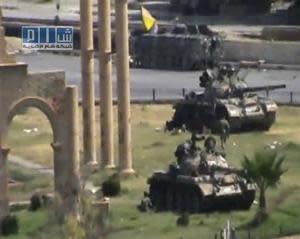 The Envoy
The EnvoyInternational outcry grows over Syria violence, but response so far constrained

In one of the bloodiest days in the Arab Spring protests against repressive regimes in the Middle East and North Africa, the Syrian military killed as may as 120 people in Hama Sunday. The brutal crackdown came on the eve of the Muslim holy month of Ramadan.
But even as the United States and European Union issued stinging condemnations of the Bashar al-Assad regime in the wake of the massacre, the international community continues to struggle in putting together a coordinated and effective response to the growing violence in Syria. American and European diplomats face a backlash among some United Nations member states stemming from the inconclusive military intervention in Libya; meanwhile, Western leaders find it hard to exert more direct diplomatic pressure on Assad's regime, thanks to Syria's own complicated geopolitical position in the Muslim world.
Leaders of other Arab states have also been distinctly muted in their response to the Syrian violence--which is estimated to have killed more than 1,600 since March. Their reluctance stems in part from concern the Syrian revolt could further exacerbate sectarian rifts between Sunni and Shia Muslims in neighboring states, including Iraq and Lebanon.
"Everybody recognizes that the Assad regime is in a real bind," said Andrew Tabler, a Syria expert at the Washington Institute for Near East Policy, in an interview with The Envoy Monday. "There are a lot of constraints, though, about actions."
"The Obama administration has a lot of constraints on them, because multilateral pressure is what works in Syria, and it's hard in August to marshal the Europeans--a confederation--plus the Turks, who have leverage there, into a concerted policy," Tabler continued. In addition, he said, the Obama administration "is also cognizant that … this revolution is not about the United States; it doesn't want to play into the regime's hands, which is very understandable."
President Barack Obama interrupted his debt-ceiling negotiations Sunday to condemn the Syrian brutality, describing the reports out of Hama as "horrifying."
"I am appalled by the Syrian government's use of violence and brutality against its own people," Obama said in a statement released by the White House Sunday. "Through his own actions, Bashar al-Assad is ensuring that he and his regime will be left in the past, and that the courageous Syrian people who have demonstrated in the streets will determine its future."
Obama vowed to work "with others around the world" in the coming days to "isolate the Assad government and stand with the Syrian people."
The European Union on Monday announced new sanctions on five members of the Syrian regime implicated in the violence, and called on the UN Security Council to act on Syria. You can watch a Reuters video report on the EU response to the crackdown here:
The UN Security Council scheduled a closed-door meeting for Monday at 5 p.m. to discuss the Syrian violence. But a resolution from the body condemning Assad's brutality has been blocked to date "by the Russians, Chinese and Indians," Tabler said. Turkey, a Syria neighbor with leverage in the region "would rather condemn the attacks like we do, but leave the door open to talk to Assad."
"What we see in Syria is the confluence of two things ... the enormous complexity on the ground that is Syria, and that goes with a very messy, complicated transition," said Mona Yacoubian, a Syria and Lebanon expert at the U.S. Institute of Peace, in an interview with The Envoy. "That coincides with, certainly on the part of the United States, very limited leverage inside the country. This is not Egypt. It is just not. We don't have the [ties to] people in the [Syrian] military, we don't have deep connections to the business elites."
"I think the U.S. position--which is essentially focused on limiting the violence, and also limiting the perception of America's role [there]--is a very smart one," said Scott Lasensky, a Middle East expert at the United States Institute of Peace. That focus "maintains [international] consensus."
It also "allows for the forces of change in Syria to build, because if you can eliminate worst acts of violence and repression and allow the demonstrations to continue, build and grow, that puts the Syrians at the center of the story, and allows the pressure to build against the regime over time," Lasensky added.
Some analysts suggested the United States work with the European Union to pursue energy sanctions on Syria.
Tabler, for one, says he expects movement on energy sanctions this week out of Washington, D.C. "We can target Syrian energy exports and finance mechanisms, and not target refined imports. We want Assad to run down his checking account."
Another factor contributing to the muted international response: the sense that the Syrian revolution is likely to be protracted and violent.
The Syrian opposition has gained some important organizational ground recently, but observers say it is still far from united. And the Assad regime still commands fierce ideological loyalty from key divisions of the Syrian security forces, which numbers 240,000 troops, said Syrian opposition analyst Radwan Ziadeh.
"Always we say that we don't need the Syrian people to pay the price for Libya," said Ziadeh, now based at George Washington University, in an interview with The Envoy last week. Ziadeh noted that several UN Security Council members, including emerging powers South Africa, Brazil and India, have professed reluctance to back such a resolution because an earlier March UN Security Council resolution condemning Libyan violence was used to justify a NATO military intervention against Muammar Gadhafi.
"None of the Syrian opposition is calling for military intervention," Ziadeh said. Even before yesterday's crackdown, Ziadeh observed that the people of Hama "discovered their power to change the regime without [international] intervention."
"By calling for political support, this actually makes more pressure on the regime to make more concessions and will get more generals to defect," Ziadeh said.

